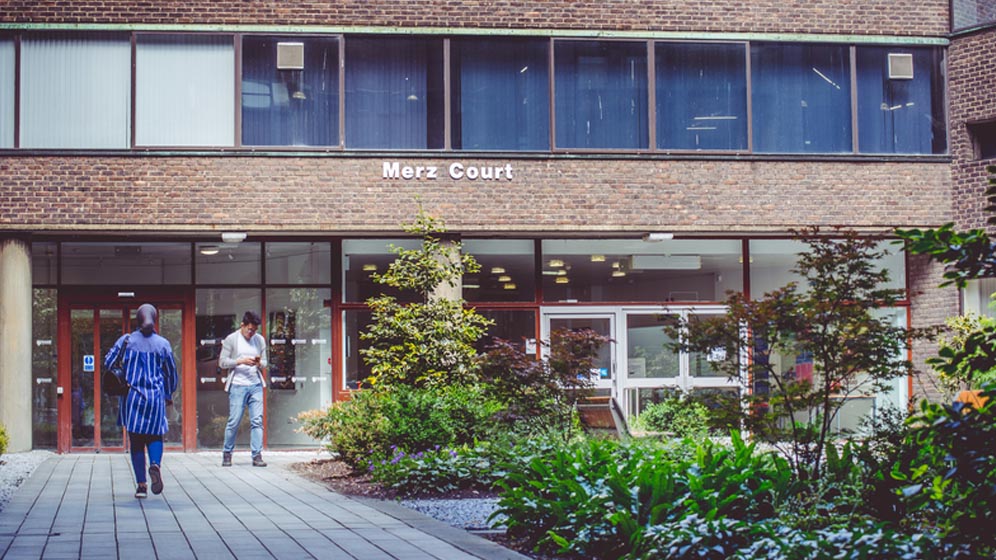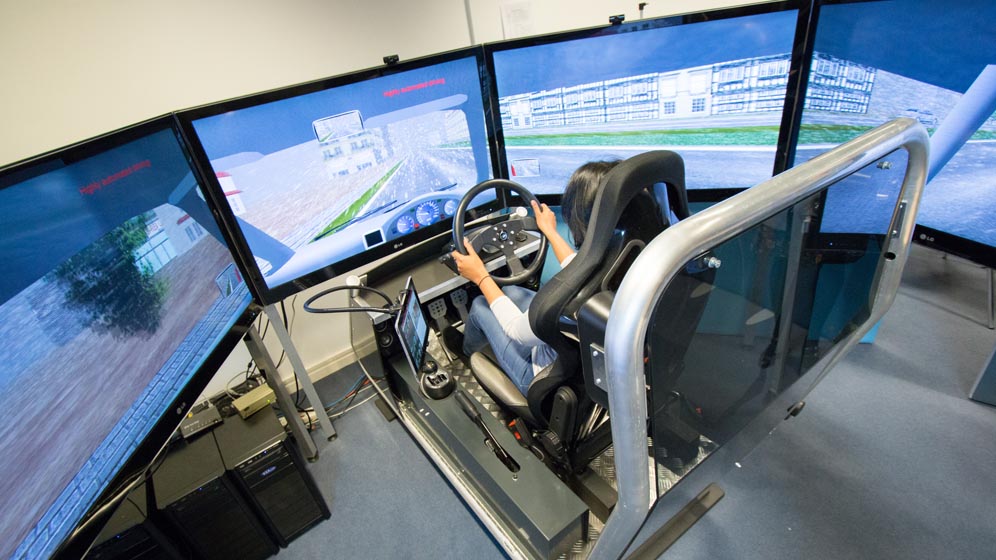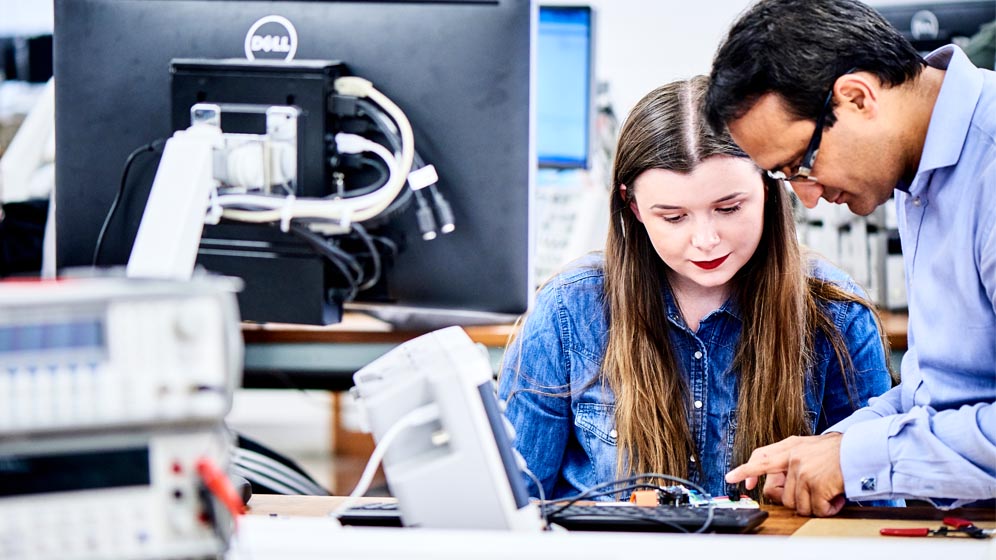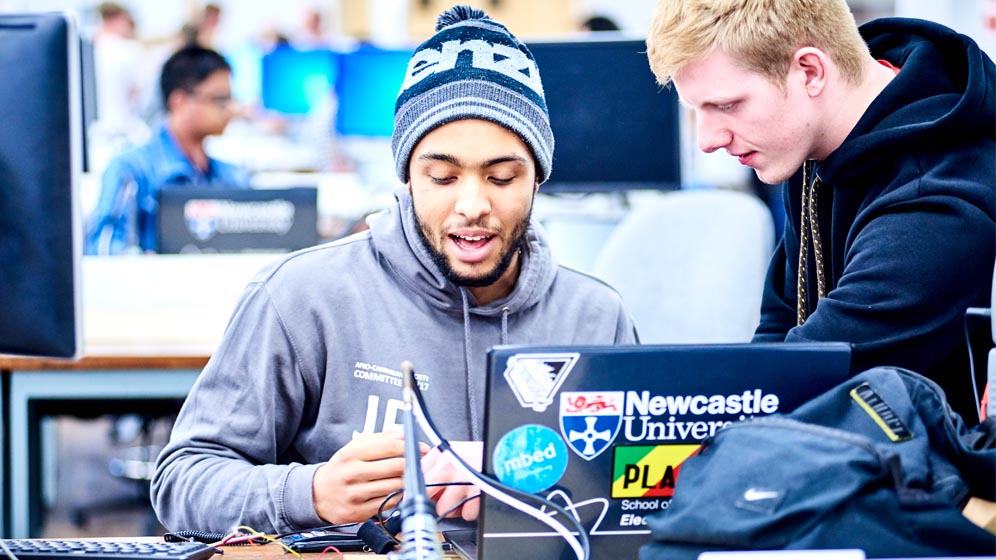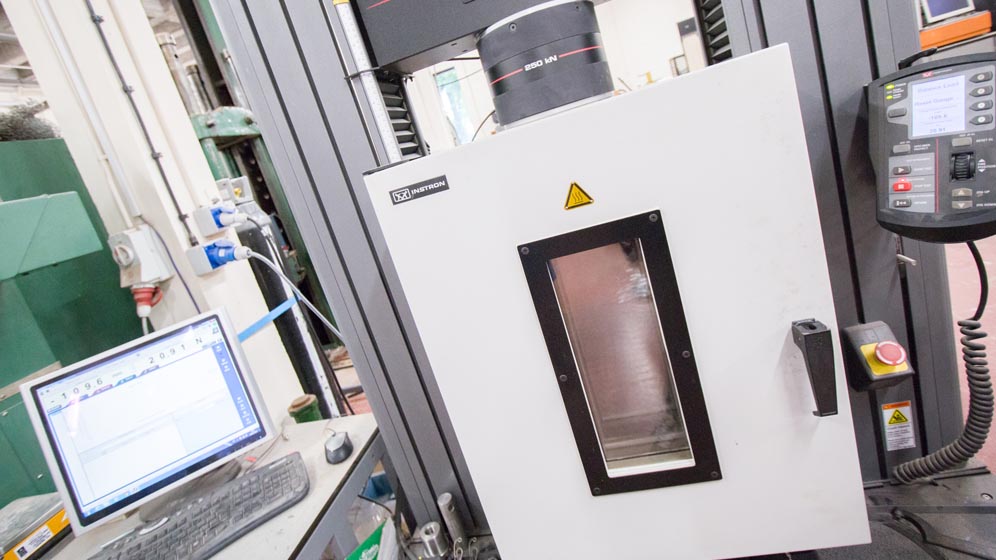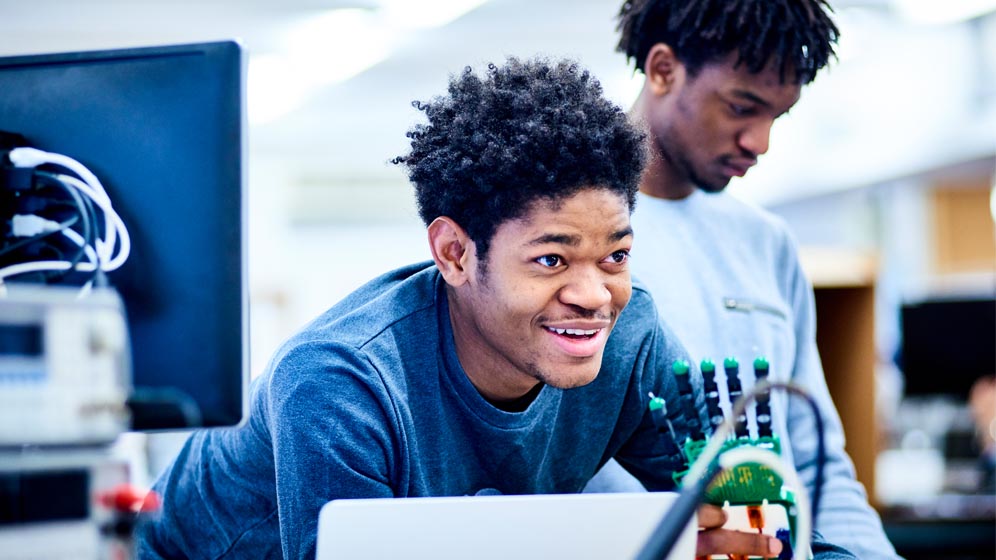Aerospace Engineering BEng Honours
- UCAS code: H400
- Full time
- 3 years
This three-year degree will equip you with essential skills to design, develop, and test aerospace systems such as aircraft, spacecraft, and satellite technology. You will develop the expertise to create innovative, sustainable solutions to global transportation challenges.
You are currently viewing course information for entry year: 2026
Next start date:
- September 2026
UCAS Institution name and code:
- NEWC / N21
Course overview
Are you interested in finding solutions to global challenges like sustainably transporting people and goods? Or developing new forms of aerospace technology, such as electrified aircraft, satellites for communication and navigation systems?
This Aerospace Engineering BEng will focus on developing your knowledge in a range of engineering disciplines. You will build a variety of skills, including:
- teamwork
- communication
- project management
You will develop a deep understanding of aerospace engineering principles and a solid foundation for a diverse and exciting career.
This programme offers comprehensive training in the theory and mechanics of aerospace technologies. You’ll enter industry with the ability to design, develop and test aerospace systems to find ways of improving their performance and sustainability.
This course consolidates our research expertise in several areas including:
- renewable fuels
- electrification of flight
- space, data and digitalisation
- sustainability in engineering and manufacture
- entrepreneurship
You'll be based in the School of Engineering in the heart of our city-centre campus. You'll benefit from our multidisciplinary approach and our region’s rich engineering heritage. You’ll also be supported by leading research and have access to state-of-the-art facilities such as the new Stephenson Building and Maker Space, preparing you for a dynamic career in various industries.
BEng or MEng?
Both our BEng degree and specialist MEng degrees provide a pathway to becoming a Chartered Engineer. This is one of the most recognisable international engineering qualifications.
Our MEng degrees are a direct route to becoming a Chartered Engineer (CEng). You don’t need to study any more qualifications after your degree to work towards chartered status.
Our three-year BEng degree can also lead to Chartered Engineer status. However, you’ll need to complete further study, such as an approved master’s degree.
READ MORE
Your course and study experience - disclaimers and terms and conditions
Please rest assured we make all reasonable efforts to provide you with the programmes, services and facilities described. However, it may be necessary to make changes due to significant disruption, for example in response to Covid-19.
View our Academic experience page, which gives information about your Newcastle University study experience for the academic year 2025-26.
See our terms and conditions and student complaints information, which gives details of circumstances that may lead to changes to programmes, modules or University services.
Additional information
This degree allows you to explore several engineering disciplines in year one. This flexible route is taught across Civil, Electrical & Electronic and Mechanical Engineering.
You'll gain an understanding of engineering in a multidisciplinary context. You'll develop diverse skills relevant to the needs of industry and today’s global challenges.
After successfully completing Stage 1, you'll have the option of transferring on to one of the accredited Civil, Electrical & Electronic or Mechanical Engineering degrees. This is subject to the degree programme regulations and capacity of the degree you are transferring to.
Quality and ranking
Professional accreditation and recognition
All professional accreditations are reviewed regularly by their professional body.
Modules and learning
Modules
The information below is intended to provide an example of what you will study.
Most degrees are divided into stages. Each stage lasts for one academic year, and you'll complete modules totalling 120 credits by the end of each stage.
Our teaching is informed by research. Course content may change periodically to reflect developments in the discipline, the requirements of external bodies and partners, and student feedback.
Optional module availability
Student demand for optional modules may affect availability.
Full details of the modules on offer will be published through the Programme Regulations and Specifications ahead of each academic year. This usually happens in May.
To find out more please see our terms and conditions
Stage 1 will provide a broad introduction to fundamental engineering principles. You’ll get involved in practical work from day one, working in an interdisciplinary team to complete an aerospace engineering design project bringing together all aspects of engineerings.
You’ll build on your knowledge of mechanics, materials, electronics, fluids and aerodynamics in this stage. You will explore topics such as thermal engineering and electrical power and conversion. You’ll also develop your teamwork, presentation and communication skills through a more advanced aerospace design project.
In Stage 3 you'll deepen your knowledge in areas such as avionics systems, propulsion technologies, and advanced aerospace manufacturing.
An individual aerospace design project, such as developing an optimised wing structure, or designing a high-performance glider will allow you to put theory into practise, and further build on your project management, research and presentation skills. You will also have the opportunity to gather in-flight data during a pilot instructed flight, and apply this in our flight simulators.
We base these figures and graphs on the most up-to-date information available to us. They are based on the modules chosen by our students in 2024-25.
Teaching time is made up of:
- scheduled learning and teaching activities. These are timetabled activities with a member of staff present.
- structured guided learning. These are activities developed by staff to support engagement with module learning. Students or groups of students undertake these activities without direct staff participation or supervision
Teaching and assessment
Teaching methods
During this degree, you will typically learn through:
- lectures
- practical work
- tutorials
- individual study
- group work
- coursework
- field trips
- industry guest speakers
Assessment methods
You'll be assessed through a combination of:
-
Case studies
-
Coursework
-
Examinations – practical or online
-
Group work
-
Practical sessions
-
Presentations
-
Projects
Skills and experience
Practical skills
You'll gain hands-on experience in our Aerospace Teaching Laboratory. This state-of-the-art facility includes wind tunnels, flight simulators, jet engines and a drone flight zone. You'll also have access to our student led Makerspace. Projects run through your degree, and you'll learn with a range of engineering tools and rapid prototype equipment such as 3D printers and laser cutters.
Your Stage 1 modules will allow you to put your classroom theory into practice as you’ll spend a considerable amount of time in laboratories.
Real business skills
In Stage 2, you'll complete an Aerospace Engineering Professional Skills module, developing your enterprise, innovation, presentation, and interview techniques. With guidance from our Careers Service, you'll shape your skills to appeal to employers and explore the business side of engineering.
Research skills
You'll be taught by academics who are leaders in their field, whose teaching is inspired by ground-breaking research in:
- electrification
- advanced manufacturing and materials
- fluid dynamics and thermal systems
- electronic and communication for extreme environments
In Stage 3 you'll complete an individual research project where you'll design, develop and test a system or device.
Opportunities
Work placement
Apply your practical skills, increase your confidence and gain real-life work experience to accelerate your career. Take a 9-12-month industrial placement in the UK or abroad. Work placements usually take place in stage 3 of your studies and extend your degree by one year.
Facilities and environment
Facilities
Our Engineering courses are taught at our city-centre campus, within the School of Engineering based in Merz Court.
You'll benefit from world-class facilities and living labs, ranging from microbiology laboratories through to at-scale engineering equipment.
Each engineering discipline has its own specialist facilities, including:
- the Millennium Laboratory – home to a wide range of facilities and experimental rigs
- Merz Court Pilot Plant Laboratory – a pilot plant with 28 experimental rigs
- BE:WISE – Europe's largest wastewater treatment research facility
- the Urban Observatory – with sensors gathering over 50 types of data across the city
- Electronics Teaching Lab – home to state-of-the-art Agilent/Keysight digital test equipment
- Clean-Room Microfabrication Lab – home to two class 100-10000 clean rooms
Support
To support you in your studies, all new students entering year 1 or year 2 will receive a start-up pack containing essential personal protective equipment.
You'll receive comprehensive support from the moment you arrive at the University. You'll be supported by personal tutors, stage tutors, and degree tutors. You'll also benefit from the School's student buddies scheme.
Your future
Graduates from this degree could go on to secure roles such as:
- aerospace engineer
- satellite engineer
- aircraft design engineer
- propulsion engineer
- systems engineer
You'll develop the necessary skills and knowledge for a career in a variety of industries and companies, for example:
- aerospace and aviation, such as Boeing, Airbus and Rolls Royce
- space exploration and satellites, such as NASA and ESA
- engineering and technology, such as Siemens and Honeywell Aerospace
- automotive and transportation, such as Formula 1 teams and Tesla
- renewable energy and environmental, such as Ørsted and Vestas
The analytical, communication and problem-solving skills developed on this programme mean you'll be highly employable in more diverse industries, including banking, finance, and business management.
Further study
The BEng and MEng programmes both provide good grounding in engineering should you wish to continue your studies at Master’s level. You may wish to explore further study in Mechanical, Electrical and Electronic Engineering, Robotics, or Sustainable Design.
Make a difference
Sorry, you need JavaScript to view this video
Careers support
Our Careers Service is one of the largest and best in the country, and we have strong links with employers. We provide an extensive range of opportunities to all students through our ncl+ initiative.
Visit our Careers Service website
Recognition of professional qualifications outside of the UK
If you’re studying an accredited degree and thinking about working in Europe after you graduate, the best place to find current information is the UK Government’s guidance on recognition of UK professional qualifications in EU member states. This official resource explains whether your profession is regulated in another country, what steps you need to take, and which organisation you should contact.
Entry requirements
All candidates are considered on an individual basis and we accept a broad range of qualifications.
The entrance requirements and offers below apply to 2026 entry.
| A-Level | |
|---|---|
| International Baccalaureate | |
|---|---|
Other UK and the Republic of Ireland qualifications
Alternative offers at Newcastle
Through one of our contextual or alternative offer routes, you could receive an offer of up to three grades lower than the typical requirements.
Contextual offers
We use certain contextual data from your UCAS form, alongside your application, to consider challenges that you may have faced in your education and the potential effect this may have had on your qualifications. This means you may be eligible to receive a lower contextual offer.
PARTNERS offers
One of the largest and longest support entry routes to university of its kind for students from underrepresented backgrounds. We support applicants from application through to study.
Realising Opportunities offers
A unique programme delivered in collaboration with 10 leading, research-intensive universities in the UK. The programme is open to students in Year 12/first year of college.
Pathways to Newcastle offers
Pathways to Newcastle, our national skills entry route, is available for specific subject areas.
High Performance Athletes
We support promising athletes at the application stage, who compete in regional, national or international levels in their sport.
Qualifications from outside the UK
English Language requirements
Entrance courses (INTO)
International Pathway courses are specialist programmes designed for international students who want to study in the UK. We provide a range of study options for international students in partnership with INTO.
These courses are specifically designed for international students who want to study in the UK and progress onto one of our undergraduate degrees. Our International Study Centre, has a range of study options including:
- International Foundation
- International Year One
- English Language courses
Find out more about International Pathway courses
Admissions policy
This policy applies to all undergraduate and postgraduate admissions at Newcastle University. It is intended to provide information about our admissions policies and procedures to applicants and potential applicants, to their advisors and family members, and to staff of the University.
University Admissions Policy and related policies and procedures
Credit transfer and Recognition of Prior Learning
Recognition of Prior Learning (RPL) can allow you to convert existing relevant university-level knowledge, skills and experience into credits towards a qualification. Find out more about the RPL policy which may apply to this course.
Tuition fees and scholarships
Tuition fees for academic year 2026-2027
The 2026 entry home fees have not yet been confirmed.
| Qualification: BEng Honours | |
|---|---|
|
Home students full time 3 years |
Tuition fees (Year 1)
Not set |
|
International students full time 3 years |
Tuition fees (Year 1)
30,700 |
Year abroad and additional costs
For programmes where you can spend a year on a work placement or studying abroad, you will receive a significant fee reduction for that year.
Some of our degrees involve additional costs which are not covered by your tuition fees.
Scholarships
Find out more about:
Open days and events
You'll have a number of opportunities to meet us throughout the year at our on-campus and virtual open days.
You'll be able to:
- explore our beautiful campus
- find out about our vibrant city
- discover what students think about studying at Newcastle
You'll also have the opportunity to speak to academic staff and find out more about the subjects you're interested in.
Find out about how you can visit Newcastle in person and virtually.
We regularly travel overseas to meet with students interested in studying at Newcastle University. Visit our events calendar to find out when we're visiting your region.
How to apply
Apply through UCAS
To apply for undergraduate study at Newcastle University, you must use the online application system managed by the Universities and Colleges Admissions Service (UCAS). All UK schools and colleges, and a small number of EU and international establishments, are registered with UCAS. You will need:
- the UCAS name and institution codes for Newcastle University (NEWC/N21)
- the UCAS code for the course you want to apply for
- the UCAS 'buzzword' for your school or college
If you are applying independently, or are applying from a school or college which is not registered to manage applications, you will still use the Apply system. You will not need a buzzword.
Apply through UCASApply through an agent
International students often apply to us through an agent. Have a look at our recommended agents and get in touch with them.
Get in touch
By phone
Call us on +44 (0) 191 208 3333 and press option 1. Our opening hours are Monday to Friday 10am until 4pm.
Live chat
Our NCL chatbot might be able to give you an answer straight away. If not, it’ll direct you to someone who can help.
You'll find our NCL chatbot in the bottom right of this page.
Online
Chat to our students
Choosing a university is a big decision. If you've got questions about a particular course, student life or the city of Newcastle, why not chat to our friendly students or graduates!
Keep updated
We regularly send email updates and extra information about the University.
Receive regular updates by email






